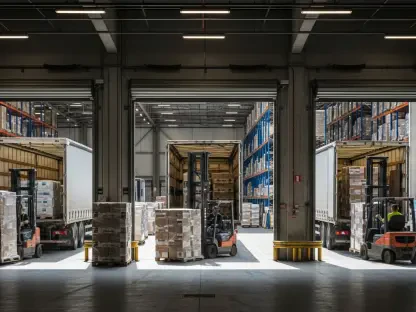The recent resolution of a labor dispute that involved DHL Express Canada and the Unifor union marks a significant development in the logistics sector. After a grueling impasse that lasted over three weeks, DHL employees voted 72% in favor of a newly negotiated labor contract, bringing operations back to normal. This decision came after more than 2,100 employees initiated a strike on June 8, triggered by a company-imposed lockout due to prolonged contract negotiations. During the strike, the company’s ability to sustain its operations was severely tested. As a result, DHL had to grapple with significant challenges until a new legal framework was enacted on June 20, prohibiting the use of replacement workers, halting all operations. The resolution is not only a success for the parties involved but also a broader indicator of the evolving dynamics in labor relations within the logistics industry.
Negotiating a Fair Agreement
The newly ratified contract includes a substantial wage increase of 15.75%, a revised owner-operator payment structure, and enhancements to pension benefits. These terms reflect an earnest effort to align employee compensation with industry standards and worker expectations. Such provisions will extend through July 1, 2029, indicating a long-term commitment to maintaining a balanced working environment. The successful negotiation of this contract can largely be attributed to Unifor’s effective bargaining strategy. Led by Unifor National President Lana Payne, the agreement underscored a keen understanding of both employee needs and operational requirements. Payne’s commendation of the bargaining committee highlights the pivotal role of organized labor in achieving equitable workplace conditions. The contract not only resolves immediate labor concerns but also sets forth a blueprint for ongoing collaboration between DHL Express Canada and Unifor, which could be mirrored by other logistics players facing similar challenges.
The strike’s onset on June 8 was marked by frustration over a prolonged lockout, which reflected deeper industry-wide tensions. Despite sustaining operations through the use of existing processes, the imposition of a law banning replacement workers forced DHL to halt activities temporarily. The resolution of this dispute demonstrates a renewed focus on cooperative negotiation, underscoring the importance of prioritizing employee welfare in maintaining operational continuity. The agreed-upon terms showcase a strategic approach towards addressing long-standing grievances, with particular emphasis on improving compensation frameworks and ensuring financial security for workers. In light of this resolution, DHL Express Canada has taken significant steps to address underlying issues that catalyzed the strike, setting a precedent for effective negotiation and conflict resolution. By establishing mechanisms that recognize the evolving needs of workers, the company has underscored the importance of equitable labor relations in fostering a productive and harmonious work environment.
Resuming Operations and Addressing Backlogs
Following the conclusion of the strike, DHL Express Canada faces the critical task of resuming operations efficiently to address accumulated backlogs. With the labor dispute resolved, the company’s priority is to expedite deliveries and restore customer trust. The reinstatement of services began on June 30, marking a swift transition from suspended operations to renewed activity. The disruption’s impact on customer service during the strike has been mitigated through DHL’s processes for handling compensation claims, showcasing the company’s commitment to addressing customer grievances. Affected customers can anticipate resumption of normal delivery schedules, with claims processed via DHL’s online platform, further streamlining the recovery phase. The emphasis on prompt customer service highlights DHL’s strategic focus on rebuilding its reputation post-strike, demonstrating an adaptive approach in the face of operational challenges.
As operations normalize, the company is likely to employ strategic measures to sustain service quality and prevent future disruptions. Enhancements in communication channels and internal processes will likely be pivotal in maintaining seamless service delivery. The effective handling of compensation claims and customer inquiries reinforces DHL’s commitment to aligning operational strategies with consumer expectations. As part of this focus, DHL is poised to reassess its operational frameworks to mitigate the impact of potential disruptions in the future. The dispute resolution and subsequent operational recovery reflect a broader trend within the logistics sector, where emphasis on employee rights and operational efficiency are increasingly recognized as central to sustaining business success. Going forward, DHL’s experience with this labor dispute may serve as a model for other companies aiming to negotiate fair contracts while maintaining robust service delivery standards.
Broad Implications for Labor Relations
The newly approved contract introduces a notable wage boost of 15.75%, modifications to owner-operator payments, and improvements in pension benefits. These terms show a sincere effort to align employee pay with both industry benchmarks and worker expectations, extending until July 1, 2029, signaling a commitment to a balanced work environment. Successfully negotiated by Unifor, led by National President Lana Payne, the contract highlights strategic bargaining and a deep understanding of employee and operational needs. Payne’s praise for the bargaining team emphasizes organized labor’s role in achieving fair workplace conditions. This deal not only resolves immediate labor disputes but also establishes a blueprint for future collaboration between DHL Express Canada and Unifor, potentially serving as a model for other logistics firms facing similar challenges. Triggered by a strike on June 8 due to a prolonged lockout, operations were sustained until a law banning replacement workers led to a temporary halt. The resolution showcases effective conflict resolution and prioritizes worker welfare, fostering a productive environment.









